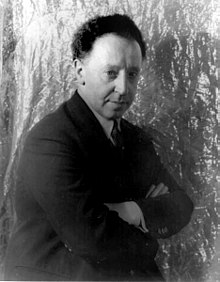User:THD3/Arthur Rubinstein

Arthur Rubinstein (January 28, 1887 – December 20, 1982) was a Polish-American[1] pianist.[2] He was known for his performances of the music of a variety of composers. He is widely considered one of the best pianists of the 20th Century.[3]
Biography
changeEarly life
changeRubinstein was born in Łódź, Poland on January 28, 1887, to a Jewish family.[4] He was the youngest of 8 children.[5]
Rubinstein became interested in the piano by watching his older sister's piano lessons. By the time he was two years old, he had perfect pitch, which means someone could play any note on the piano and Rubinstein would know what that note was. Rubinstein's father wanted him to learn the violin. Arthur, who was only interested in learning piano, smashed the violin he was given and was spanked for it. Thus, Rubinstein started piano lessons. Rubinstein later said that he was often lazy while practicing, playing the piano with one hand while eating chocolates with another.
When Rubinstein was four, his parents took him to play for the great Hungarian violinist Joseph Joachim, who was a friend of the composer Johannes Brahms. Joachim was very impressed, and arranged for Rubinstein to study piano in Warsaw, the capitol city of Poland. When he was ten years old, Rubinstein moved to Berlin to continue his studies. In 1900, at age 13, he made his debut with the Berlin Philharmonic, followed by appearances in Germany and Poland. He also studied with Karl Heinrich Barth.
Career
changeIn 1904, Rubinstein ended his studies and moved to Paris to launch his career. There he met the composers Maurice Ravel. He became one of the first pianists to play their music. Sometimes audiences did not understand this new music and would “boo” Rubinstein for playing it.[6]
Rubinstein made his New York debut at Carnegie Hall in 1906, and toured the United States. He was not well received in the United States, with critics writing that his playing was exciting but sometimes sloppy and immature. Rubinstein did not return for several years.
Rubinstein played in Germany in 1914. But Germany’s conduct in World War I a few years later, led the pianist to vow never to play there again. [6] He lived in London during World War I. In 1916 and 1917, Rubinstein made his first tours in Spain and South America where he was wildly acclaimed. It was during those tours that he became known for playing the music of Spanish and Latin American composers like Enrique Granados, Isaac Albéniz, Manuel de Falla, and Heitor Villa-Lobos.
In 1921 returned to America tours, travelling to New York with Paul Kochanski (they remained close friends until Kochanski's death in 1934) and Karol Szymanowski. Again, his performances were not well received.
In the summer of 1932, the pianist, who stated he didn’t practice enough in his early years, stopped playing concerts for several months to practice harder.
In 1937, he returned to the United States for the first time since his summer of practice. This time, he was well received, with Olin Downes writing “We have missed Mr. Rubinstein and are glad to have him back”. When World War II started in 1939, Rubinstein's moved to the United States and he played most of his concerts there for several years. He became an American citizen in 1946.
Most of Rubinstein’s concerts were either alone or with an orchestra. But he was also known for playing chamber music, which is music written for a small group performers - usually between 2 and 5. He worked with other musicians such as Henryk Szeryng, Jascha Heifetz, Pablo Casals, Gregor Piatigorsky, and the Guarneri Quartet.
Recordings
changeIn 1910, Rubinstein recorded Liszt’s Hungarian Rhapsody No. 10, [7]but he didn’t like the way the recording made the piano sound “like a banjo”. He did not record again until 1928, when recordings sounded better.
Rubinstein made many recordings until he retired in 1976 - it would take more than 107 hours to listen to all of Rubinstein’s recordings. One reason he made so many recordings is that whenever there were improvements that made recordings sound better, he would make new recordings of his favorite pieces. Another reason is that he knew a lot of music, especially pieces written between 1800 and 1920. Rubinstein had a very good memory, could learn new works easily, and spoke 8 languages.
Except for the Études, he recorded most of the works of Chopin. Rubinstein’s favorite composer was Brahms, and he recorded many of Brahms' pieces. He also recorded many of Beethoven's most important works.
Late career and retirement
changeRubinstein played in public for over 70 years. By the 1970s, his eyesight and hearing were failing and he decided to stop playing concerts. His last public concert was in May, 1976, in London. He was 89 years old.
During his retirement, he finished writing a book about his life, gave advice to younger pianists, and travelled. He died on December 20, 1982 - just a few weeks before his 96th birthday.
References
change- ↑ >http://www.nytimes.com/learning/general/onthisday/bday/0128.html "Rubinstein became an American citizen in 1946..."
- ↑ >http://www.nytimes.com/learning/general/onthisday/bday/0128.html "Rubinstein became an American citizen in 1946..."
- ↑ http://www.nytimes.com/learning/general/onthisday/bday/0128.html "In the pantheon of 20th-century pianists, Mr. Rubinstein's place is assured as one of the titans".
- ↑ Sachs 1997
- ↑ Sachs 1997
- ↑ 6.0 6.1 Sachs 1997,
- ↑ http://books.google.com/books?id=44Sl_52ePdYC&pg=RA1-PA443&lpg=RA1-PA443&dq=rubinstein+polish+favorit+1910&source=bl&ots=hKAp7X8dBA&sig=L6kooHg3-OY-KtKf2bs7GjCpQAI&hl=en&ei=K8SSSvGMFpWENsT8rZIK&sa=X&oi=book_result&ct=result&resnum=2#